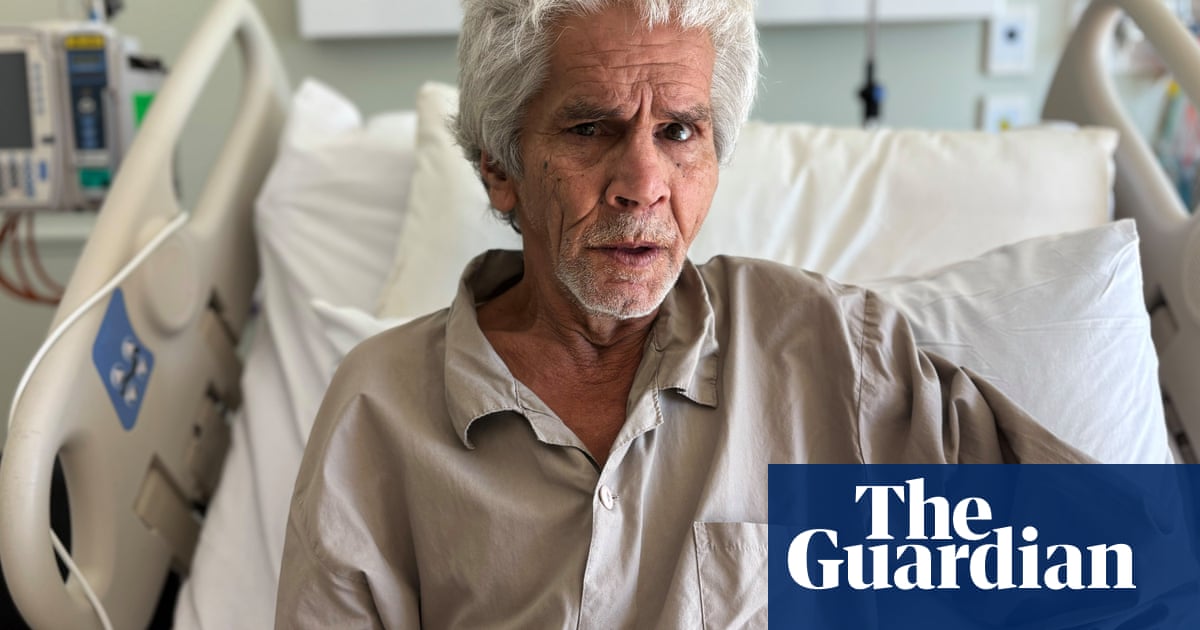Sitting on his hospital bed, his voice scratchy and strained, Harvey Coyne gives a bleak insight into what will happen if he’s evicted from community housing in Perth.
“Without it, I’m pretty well buggered,” Coyne says.
The Noongar elder, 66, is suffering from serious ill health.
He has severe heart disease, requiring a pending triple bypass surgery, and this week had another heart attack, which left him hospitalised in Perth’s Fiona Stanley hospital.
Coyne has emphysema, hypertension and is blind in one eye. Earlier this year, he suffered a fall that left him with a broken hip.
He was taken from his family as part of theStolen Generations, leaving him with complex trauma.
Coyne has been forced to fight another battle, too.
Sign up for Guardian Australia’s breaking news email
The provider of his community housing unit in Kenwick, on the south-eastern fringes of Perth, is trying to kick him out.
The organisation, Housing Choices Australia, has used a no-fault eviction – something thatWestern Australia, unlike most other states, still deems lawful – to remove him.
Coyne and his advocates say the decision to evict him will force him into homelessness, returning him to the rough sleeping that he endured before moving into theHousingChoices Australia property in 2021.
Court documents allege the termination notice was sent while Coyne was both hospitalised and grieving for his nephew, who died while living with him.
The documents allege he was subjected to 10 inspections in a single year. Each raised new issues that Coyne said he “struggled to address … due to my age and health”.
The case has led to an intervention by leading health researcher Emeritus Prof Fiona Stanley, a former Australian of the Year and namesake of the hospital where Coyne was being treated this week.
Stanley earlier this year wrote to Housing Choices Australia expressing her “grave” concerns about its treatment of Coyne – particularly given his pending triple-bypass.
“This is an extremely serious operation with a number of risks for Mr Coyne. It is imperative that he has stable and secure accommodation in which to prepare for this procedure and then to recover and rehabilitate afterwards,” Stanley wrote in March.
“Mr Coyne’s condition is life-threatening, and it is inconceivable to me that he should face homelessness at this time.”
Coyne is now fighting his eviction in the Perth magistrates court, which is due to deliver judgment next week.
Housing Choices Australia said it was unable to comment on Coyne’s case specifically due to ongoing legal proceedings and privacy concerns.
“Housing Choices Australia is committed to providing safe, secure, and appropriate housing for all our residents and supporting them to sustain their tenancies,” the chief executive officer, David Fisher, said. “As a not-for-profit community housing provider, we operate under the same standards and regulatory requirements as government housing agencies, and we take that responsibility seriously.”
It previously told advocates it was working with the state government to find a “sustainable housing solution that considers both his immediate and longer-term needs”.
Sign up toBreaking News Australia
Get the most important news as it breaks
after newsletter promotion
Court documents suggest it had previously raised concerns about noise, visitation and the cleanliness of the property, all of which Coyne disputes.
Academics and Coyne’s housing advocate, Jesse Noakes, say his case is symptomatic of a broader issue.
Coyne’s home would once have been part of the public housing system. Now, the state government has shifted it to community housing under the management of Housing Choices Australia.
Experts say state and federal governments are increasingly relying on organisations like Housing Choices Australia to house low-income and vulnerable citizens. The trend is leading to unnecessary evictions and the erosion of tenant rights, they say.
In a briefing paper on Coyne’s case, David Kelly, a human geographer with RMIT’s Centre for Urban Research, said community housing units had increased by 61.4% in the past decade, helped in part by heavy government subsidies.
The stock of public housing units had declined by 7.4% over the same period.
Kelly said the shift had “redefined both the nature of the tenancy and the rights attached to it”.
“Tenants like Harvey, had they remained in public housing, would have been afforded stronger on-paper protections against eviction, and subjected to fewer behavioural interventions disguised as support,” he said.
“These homes have been steadily moved into the portfolios of community housing organisations (CHOs), who operate under different regulatory frameworks and priorities.”
Housing Choices Australia receives public funding. Records filed with the ACNC suggest about half of its yearly revenue, or roughly $33m, comes from government funding.
It also manages a huge number of dwellings. As of mid-2024, records show it owned 3,099 units and managed a further 4,395 units of housing. Its total assets are worth $1.2bn, according to its latest financial reports.
The not-for-profit publicly states that its vision is for “all people in Australia to have a safe, affordable home and the opportunity to thrive”.
WA Greens MLC Tim Clifford said Coyne’s case illustrated the dangers of outsourcing public housing. He said it was “unconscionable” that he should face eviction, given his ill health.
“It is clear from Mr Coyne’s case that the choice to outsource public housing to big NGOs means that there is less transparency, less accountability and less access to justice for renters,” Clifford said.
Fisher said Housing Choices Australia strongly believed that community housing -operated social housing was an important part of the solution to the “growing housing crisis in our country”.
